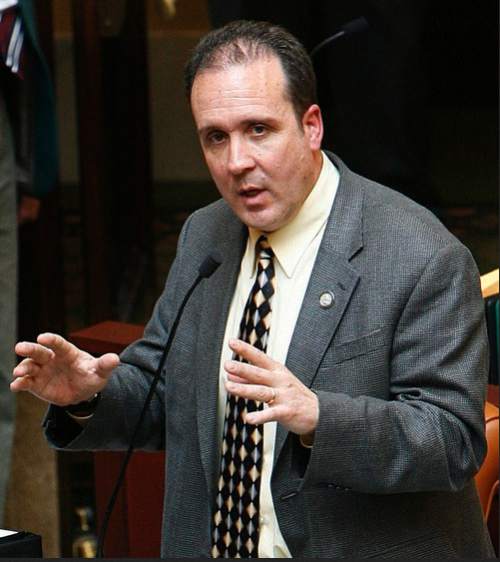This is an archived article that was published on sltrib.com in 2016, and information in the article may be outdated. It is provided only for personal research purposes and may not be reprinted.
The Tribune recently ran an article about the nearly 8,000 lawsuits in small claims court directly related to payday lenders. Wendy Gibson, a spokesperson for the payday loan industry, responded by saying she would "welcome discussion and debate about the state of the industry."
We say, Bravo! Utah's payday loan industry is very much in need of further discussion and debate.
So many of us are drawn in by dramas like The Sopranos or the Godfather trilogy in large part by the moral ambiguity these shows present. You may find yourself cheering for people who are committing despicable acts of violence, but the moral code of the mob (at least in fictional depictions) provides a sense of order, albeit a warped one. These depictions put society in front of a mirror and force introspection.
The legal philosopher, Robert Cover, wrote "Legal interpretation takes place in a field of pain and death." We hide the pain in legalese, euphemism and an obliviousness to what the law actually does. For instance, a man shows up at your bank with a gun. He takes all the money out of your account, then this same man takes his gun to your employer and demands money out of your paycheck. This isn't some fictional mob tough guy. This is the law in action, and the man with the gun is a sheriff. Our legal euphemism for sending out the muscle to collect? Garnishment.
This isn't to suggest that payday lenders are mobsters. But as legitimate, legal enterprises, payday lenders do access the courts at the rate they do to avail themselves of the state-sanctioned "muscle" to collect on their behalf.
Gibson asked for arguments grounded in facts and research. Fair enough. Take 10 bankruptcy cases that we are personally familiar with, all recently filed in either December 2015 or January of this year: Among those 10 cases, there were 19 high-interest, non-payday loans; 22 payday loans; five lawsuits tied to high-interest loans and five lawsuits filed by payday lenders. One client with a net income of $1,415 per month had payday loans totaling $5,928.
The payday lending business model is a modified game of musical chairs. Customer 1 takes out a loan from payday Lender A at 528 percent interest, which will double the amount of the loan in the 10-week interest restriction currently under Utah law. When this loan comes due, Customer 1 goes to payday Lender B and takes out a new loan at 528 percent interest to pay off payday Lender A. When the second loan comes due, Lender A, having been paid off earlier, gives the customer a loan to pay off Lender B.
The tragic game continues until the customer collapses financially under the weight of these untenable loan obligations, leading to legal action against these former clients initiated by the payday lenders.
Up until that time, providing the customer can keep the music playing, payday lenders rake in 528 percent interest on their money from the poorest members of our community.
This game of musical loans is played out countless times with clients. Payday lenders don't want default. They want loan turnover to keep the business profitable. They don't want the game of musical loans to end. This also explains many of the statistics in Ms. Gibson's op-ed, (i.e. most loans are repaid in full in 29 days and only 6.6 percent enter into an extended payment plan — precisely the results you'd expect the musical loan model to produce).
Furthermore, most payday loan clients aren't aware of the extended payment plan option. They simply get new loans to pay off old ones.
No one needs weep for payday lenders because of Utah's 10-week restriction on interest on payday loans, either. Payday lenders accomplish in 10 weeks what other lenders realize in 10 years at 10 percent interest. Plus, when it all falls apart, our legal system legally backstops them by giving payday lenders unlimited access to legal muscle to collect those last dollars of interest using our courts and our sheriffs.
At the very least, the Legislature ought to require some minimal underwriting before giving payday lenders access to this legal collection muscle.
Rep. Bradley Daw serves on the Social Services Appropriations subcommittee and represents District 60 in Orem. E. Kent Winward is a consumer bankruptcy attorney with more than 25 years experience.



